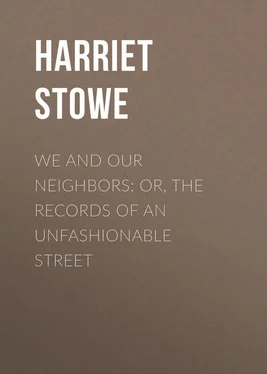Harriet Stowe - We and Our Neighbors - or, The Records of an Unfashionable Street
Здесь есть возможность читать онлайн «Harriet Stowe - We and Our Neighbors - or, The Records of an Unfashionable Street» — ознакомительный отрывок электронной книги совершенно бесплатно, а после прочтения отрывка купить полную версию. В некоторых случаях можно слушать аудио, скачать через торрент в формате fb2 и присутствует краткое содержание. ISBN: , Жанр: foreign_prose, на английском языке. Описание произведения, (предисловие) а так же отзывы посетителей доступны на портале библиотеки ЛибКат.
- Название:We and Our Neighbors: or, The Records of an Unfashionable Street
- Автор:
- Жанр:
- Год:неизвестен
- ISBN:http://www.gutenberg.org/ebooks/48603
- Рейтинг книги:4 / 5. Голосов: 1
-
Избранное:Добавить в избранное
- Отзывы:
-
Ваша оценка:
- 80
- 1
- 2
- 3
- 4
- 5
We and Our Neighbors: or, The Records of an Unfashionable Street: краткое содержание, описание и аннотация
Предлагаем к чтению аннотацию, описание, краткое содержание или предисловие (зависит от того, что написал сам автор книги «We and Our Neighbors: or, The Records of an Unfashionable Street»). Если вы не нашли необходимую информацию о книге — напишите в комментариях, мы постараемся отыскать её.
We and Our Neighbors: or, The Records of an Unfashionable Street — читать онлайн ознакомительный отрывок
Ниже представлен текст книги, разбитый по страницам. Система сохранения места последней прочитанной страницы, позволяет с удобством читать онлайн бесплатно книгу «We and Our Neighbors: or, The Records of an Unfashionable Street», без необходимости каждый раз заново искать на чём Вы остановились. Поставьте закладку, и сможете в любой момент перейти на страницу, на которой закончили чтение.
Интервал:
Закладка:
CHAPTER IX
JIM AND ALICE
The recent discussions of the marriage question, betokening unrest and dissatisfaction with the immutable claims of this institution, are founded, no doubt, on the various distresses and inconveniences of ill-assorted marriages.
In times when the human being was little developed, the elements of agreement and disagreement were simpler, and marriages were proportionately more tranquil. But modern civilized man has a thousand points of possible discord in an immutable near relation where there was one in the primitive ages.
The wail, and woe, and struggle to undo marriage bonds, in our day, comes from this dissonance of more developed and more widely varying natures, and it shows that a large proportion of marriages have been contracted without any advised and rational effort to ascertain whether there was a reasonable foundation for a close and life-long intimacy.
It would seem as if the arrangements and customs of modern society did everything that could be done to render such a previous knowledge impossible.
Good sense would say that if men and women are to single each other out, and bind themselves by a solemn oath, forsaking all others to cleave to each other as long as life should last, there ought to be, before taking vows of such gravity, the very best opportunity to become minutely acquainted with each other's dispositions, and habits, and modes of thought and action. It would seem to be the dictate of reason that a long and intimate friendship ought to be allowed, in which, without any bias or commitment, young people might have full opportunity to study each other's character and disposition, being under no obligation, expressed or implied, on account of such intimacy to commit themselves to the irrevocable union.
Such a kind of friendship is the instinctive desire of both the parties that make up society. Both young men and young women, as we observe, would greatly enjoy a more intimate and friendly intercourse, if the very fact of that initiatory acquaintance were not immediately seized upon by busy A, B, and C, and reported as an engagement. The flower that might possibly blossom into the rose of love is withered and blackened by the busy efforts of gossips to pick it open before the time.
Our young friend, Alice Van Arsdel, was what in modern estimation would be called just the "nicest kind of a girl." She had a warm heart, a high sense of justice and honor, she was devout in her religious profession, conscientious in the discharge of the duties of family life. Naturally, Alice was of a temperament which might have inclined her to worldly ambition. She had that keen sense of the advantages of wealth and station which even the most sensible person may have, and, had her father's prosperity continued, might have run the gay career of flirtation and conquest supposed to be proper to a rich young belle.
The failure of her father not only cut off all these prospects, but roused the deeper and better part of her nature to comfort and support her parents, and to assist in all ways in trimming the family vessel to the new navigation. Her self-esteem took a different form. Had she been enthroned in wealth and station, it would have taken pleasure in reigning; thrown from that position, it became her pride to adapt herself entirely to the proprieties of her different circumstances. Up to that hour, she had counted Jim Fellows simply as a tassel on her fan, or any other appendage to her glittering life. When the crash came, she expected no more of him than of a last summer's bird, and it was with somewhat of pleased surprise that, on the first public tidings of the news, she received from Jim an expensive hot-house bouquet of a kind that he had never thought of giving in prosperous days.
"The extravagant boy!" she said. Yet she said it with tears in her eyes, and she put the bouquet into water, and changed it every day while it lasted. The flowers and the friends of adversity have a value all their own.
Then Jim came, came daily, with downright unsentimental offers of help, and made so much fun and gaiety for them in the days of their breaking up as almost shocked Aunt Maria, who felt that a period of weeping and wailing would have been more appropriate. Jim became recognized in the family as a sort of factotum, always alert and ready to advise or to do, and generally knowing where every body or thing which was wanted in New York was to be found. But, as Alice was by no means the only daughter, as Marie and Angelique were each in their way as lively and desirable young candidates for admiration, it would have appeared that here was the best possible chance for a young man to have a friendship whose buds even the gossips would not pick open to find if there were love inside of them. As a young neophyte of the all-powerful press, Jim had the dispensation of many favors, in the form of tickets to operas, concerts, and other public entertainments, which were means of conferring enjoyment and variety, and dispensed impartially among the sisters. Eva's house, in all the history of its finding, inception, and construction, had been a ground for many a familiar meeting from whence had grown up a pleasant feeling of comradeship and intimacy.
The things that specialized this intimacy, as relating to Alice more than to the other sisters, were things as indefinite and indefinable as the shade mark between two tints of the rainbow; and yet there undoubtedly was a peculiar intimacy, and since the misfortunes of the family it had been of a graver kind than before, though neither of them cared to put it into words. Between a young man and a young woman of marriageable age a friendship of this kind, if let alone, generally comes to its bud and blossom in its own season; and there is something unutterably vexatious and revolting to every fibre of a girl's nature to have any well-meaning interference to force this denouement.
Alice enjoyed the unspoken devotion of Jim, which she perceived by that acute sort of divination of which women are possessed; she felt quietly sure that she had more influence over him, could do more with him, than any other woman; and this consciousness of power over a man is something most agreeable to girls of Alice's degree of self-esteem. She assumed to be a sort of mentor; she curbed the wild sallies of his wit, rebuking him if he travestied a hymn, or made a smart, funny application of a text of Scripture. But, as she generally laughed, the culprit was not really overborne by the censure. She had induced him to go with her to Mr. St. John's church, and even to take a class in the Sunday-school, where he presided with the unction of an apostle over a class of street " gamins ," who certainly never found a more entertaining teacher.
Now, although Marie and Angelique were also teachers in the same school, it somehow always happened that Jim and Alice walked to the scene of their duties in company. It was one of those quiet, unobserved arrangements of particles which are the result of laws of chemical affinity. These street tête-à-têtes gave Alice admirable opportunity for those graceful admonitions which are so very effective on young gentlemen when coming from handsome, agreeable monitors. On a certain Sunday morning in our history, as Alice was on her way to the mission school with Jim, she had been enjoining upon him to moderate his extreme liveliness to suit the duties of the place and scene.
"It's all very well, Alice," he said to her, "so long as I don't have to be too much with that St. John. But I declare that fellow stirs me up awfully: he looks so meek and so fearfully pious that it's all I can do to keep from ripping out an oath, just to see him jump!"
"Jim, you bad fellow! How can you talk so?"
"Well, it's a serious fact now. Ministers oughtn't to look so pious! It's too much a temptation. Why, last Sunday, when he came trailing by so soft and meek and asked me what books we wanted, I perfectly longed to rip out an oath and say, 'Why in thunder can't you speak louder.' It's a temptation of the devil, I know; but you mustn't let St. John and me run too much together, or I shall blow out."
Читать дальшеИнтервал:
Закладка:
Похожие книги на «We and Our Neighbors: or, The Records of an Unfashionable Street»
Представляем Вашему вниманию похожие книги на «We and Our Neighbors: or, The Records of an Unfashionable Street» списком для выбора. Мы отобрали схожую по названию и смыслу литературу в надежде предоставить читателям больше вариантов отыскать новые, интересные, ещё непрочитанные произведения.
Обсуждение, отзывы о книге «We and Our Neighbors: or, The Records of an Unfashionable Street» и просто собственные мнения читателей. Оставьте ваши комментарии, напишите, что Вы думаете о произведении, его смысле или главных героях. Укажите что конкретно понравилось, а что нет, и почему Вы так считаете.












